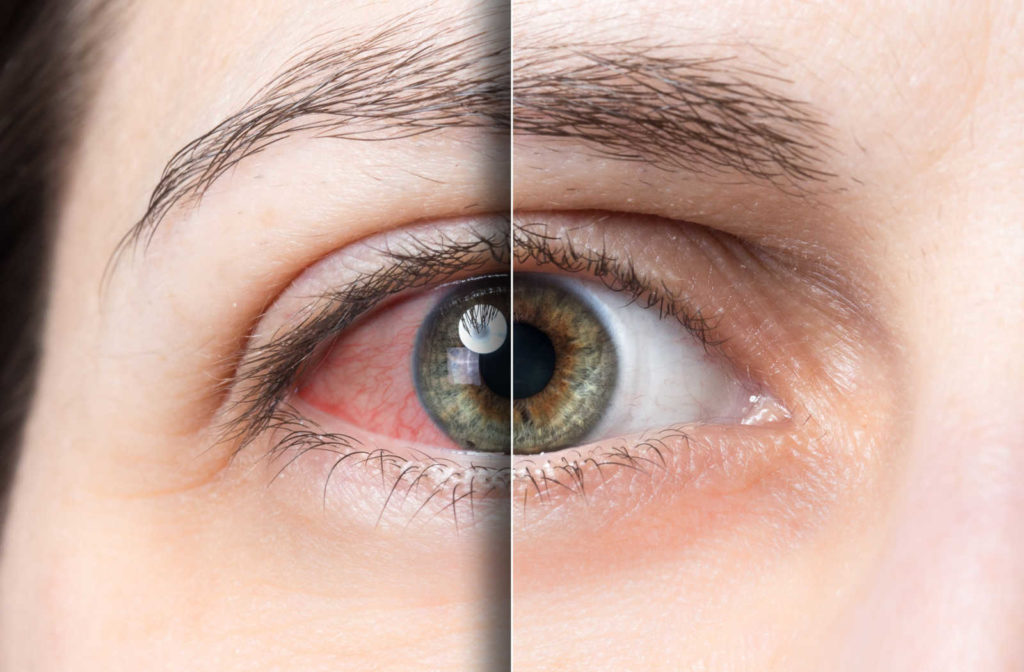Contact lenses are a popular choice for many people. They provide an alternative to glasses. And more importantly, correct vision in nearsightedness, farsightedness, and astigmatism.
However, if you have dry eyes, you know that a gritty feeling can make wearing contact lenses somewhat uncomfortable. You may question whether you can still wear contacts with dry eyes. The answer is yes.
While standard contact lenses may not work for everyone, a wide selection of contact lenses can work for those suffering from dry eyes. Determining the best type of contact lens for you involves an eye evaluation.
We take a closer look at dry eyes and some things to consider when choosing contact lenses, specifically for dry eyes.
Dry Eye
Dry eyes are when your eyes are chronically dry due to insufficient or good quality tears. It can cause a lot of pain and discomfort, including the following symptoms:
- Stinging and burning
- Blurred vision
- Gritty feeling
- Redness
- Irritation
- Teary eyes
- Pain
Causes of Dry Eye
Dry eyes can develop due to various causes. The natural aging process is one reason. Others are:
- Gender: Women develop dry eyes more than men due to hormonal changes, menopause, and pregnancy.
- Medication: Certain medications, such as antihistamines, decongestants, antidepressants, and blood pressure medication.
- Medical conditions: Conditions such as diabetes, thyroid, arthritis, and inflammation of the eyes (blepharitis).
- Environment: Smoke, wind, and dry climates.
- Other: Long periods in front of the screen and long-term contact lens wear can also contribute to dry eyes.
If your eyes are chronically dry and uncomfortable, then wearing contact lenses can aggravate the problem. It doesn’t mean you have to give them up. Treating the underlying condition or choosing a different lens type can help relieve dry eye symptoms.
Contact Lenses for Dry Eye
If contact lenses worsen your dry eye symptoms, various types of contact lenses are available to you today. These include:
Hard and Soft Contact Lenses
Lens material for contact lenses comes in hard and soft materials. Soft lenses consist of flexible plastic allowing oxygen to pass through and hydrogel, containing water. Silicone-hydrogel soft contact lenses slow the rate of water evaporation. They can reduce dry eye symptoms better than hydrogel contacts.
Soft contact lenses range from daily disposables to bi-weekly (2-week replacements) to monthly (monthly replacement). Daily contact lens options offer healthy moisture retention throughout your day. They also help reduce any discomfort associated with long-term lens wear.
Rigid gas-permeable contact lenses are hard lenses that still allow oxygen to reach the cornea. They provide adequate moisture for your eyes throughout the day but take some time to get used to and can lead to discomfort after extended wear.
Scleral lenses, a type of hard lens, have a larger diameter and cover the cornea and part of the white of the eye. They are suitable for irregular corneas, hard-to-fit eyes, or dry eyes.
They sit over the cornea and rest on the sclera, leaving a fluid reservoir over the cornea. It hydrates the eyes better and can reduce dry eye symptoms.
Preventing Contact Lens Dry-Eye
We cover several ways to reduce or even prevent your contact lens-related dry eyes:
- Always clean and store your contact lenses properly. Doing so will ensure that they will last longer and be comfortable for you; this also won’t worsen your dry eyes.
- Change contact lenses as recommended.
- Use preservative-free contact lens solution or change to a different brand to prevent irritation and dry eyes.
- Use rewetting drops before wearing your contact lenses and throughout the day if needed.
- Use preservative-free eye drops to increase moisture in the eyes.
- Have regular eye and contact lens exams.
If you experience dry eyes even after following the above tips, stop wearing your contact lenses and reach out to your eye doctor.
Contact Lenses for Dry Eyes
The bottom line is you can wear contact lenses with dry eyes. Properly fitted, high-quality contact lenses and the correct pair of contacts for your eyes ensures maximum comfort and hydration.
Still have questions about wearing contact lenses with dry eyes, book an appointment with Perspective Eye Center. No matter the severity of your symptoms, we can help provide clear and comfortable vision.



